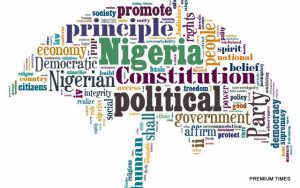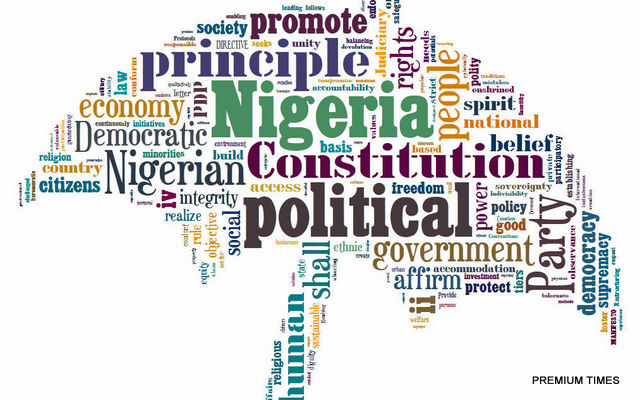
As the Nigerian elections come around, the broadcast is out again and every pundit on Africa especially the western ones are on, once more, about Nigeria disintegrating. This alarm and concern for Nigeria by outsiders seems to me not so much about caring but about perpetuating the myth of Africa’s failure in governing itself.
In my life time, I do not recall a time when the general perception was not that Nigeria was at the brink of shattering into its regional pieces. Of course this perception is a result of the way Nigeria was put together – the amalgamation of different nation states. This peculiarity is not unique to Nigeria. Every African country has some fault lines around ethnicity based on the way the countries were created. Colonial powers divided and negotiated land areas between themselves based not on the people and how similar or different they were, but on the “treasures” they could get from these lands to take over to Europe. It therefore should be no surprise that countries that were put together in the interest of Europe did not start the negotiation for how the different nation states will live together until after independence, and this negotiation is still going on in Africa today. It is what led to the genocide in Rwanda, the post-election riots in Kenya, and the multiple crises in Sudan and Somalia – every war ever fought on African soil had something to do with ethnicity.
In Nigeria, this fissure led to a civil war which people thought would end the nation. Even before the war broke out, the events leading up to it suggested that Nigeria could not survive. The first coup and its lack of regional balance in execution, followed by pogroms in the North against the Igbos, then retaliations and eventual declaration of secession by the Igbos in the South-East after negotiations for more self-rule failed, collectively did not augur well that the country will survive into a new decade after independence in 1960. At that time, more people betted on the survival of Biafra than on the survival of Nigeria.
But Nigeria survived and experienced military rule for decades with coups and counter-coups, but it kept on going. Then the end of the military era came, again in a critical mode that made people predict that the country would disintegrate. There was agitation for secession, this time from the South-West due to the unfairness of disallowing the first duly elected person from the zone to govern and his subsequent death in jail. There was militancy in the oil producing South-South region against the injustice of oil coming from their lands without benefiting human or social developments in the area. By most people’s accounts, this again was unsustainable and Nigeria would surely fall apart.
Even during these 16 years of democracy, when there was the first death of a sitting President at which many panicked and thought this could not be resolved in a way that would hold Nigeria together, we overcame and Nigeria stayed together. The South-South militancy died down on the rise of a South-South president, but now we have militancy in the North-East which has morphed into terrorism.
The current election pits an incumbent seemingly bent on staying in power against a strong, organized opposition bent on taking the incumbent out. To me what we have is democracy at its best. Yes, oil revenues are down and inflation is in the double digits, but we have been here before – inflation in the 1980’s was much worse than anything we are experiencing today. To paraphrase Mark Twain: the rumors of Nigeria’s death have been greatly exaggerated. This is not a struggle for survival but a struggle to thrive. We will survive but will we thrive?
The struggle to thrive, and thrive better, is a never ending one in nation building. The nation states that make up these relatively new nations in Africa will continue to agitate for generations to come. The Scottish are still questioning their inclusion in the United Kingdom although that union started in the 1700’s. In my life time, Czechoslovakia disintegrated into unit ethnic parts. South Sudan, created to stop one crisis, went on to create a new one. Sometimes disintegration solves no problem. Nation states have to learn to negotiate within these artificial boundaries for now and maybe change them later.
The question should be: what is the fundamental issue nation states jostle over?
In the end, it is about fairness and justice to all sides. If that is the case then all these agitations should be about creating fair and just solutions, some of which could be temporary resolutions that bring some respite to specific aggrieved groups. Negotiation can involve devolution of power to regional or smaller, local institutions. Devolution works because it creates accountability closer to the people at a level at which they can punish corrupt public officials and politicians.
What Nigeria is going through and will continue to go through for generations is the negotiation by nation states within the entity of Nigeria for fairness and justice. If this leads to getting to the brink so be it. Democracy by the way it is implemented is about resolving issues by negotiation, agitation, election and sometimes revolution if necessary.
We should not be afraid of being at the brink, being at the brink has created the bustling dynamic society that is Nigeria, and we should be proud that we are pushing the brink. People who push the brink are innovators and creators that change the world, Nigeria will stay on the brink to change the perception of African countries as perpetual failed states. The brink is where change and ultimately progress is created.
